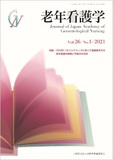Japanese
English
- 販売していません
- Abstract 文献概要
- 参考文献 Reference
抄録
寝たきりで言語的コミュニケーションが困難な高齢者の療養生活に関する意向を医療療養病棟の看護師が日々の入院生活のなかからどのように汲み取っているのかを明らかにすることを目的に,看護師9人に半構成的面接を実施し質的記述的に分析した.その結果,【サマリーや家族からの情報をもとに関わりをもち患者の反応をみる】【意図的に関わる時間を設けて声をかけたり,身体に触れたりしながら隅々まで観察し小さなサインからみる】【その人特有のサインを介護やリハビリテーション職員を含めたチームで共有する】【元気なころの本人の思いを知る家族の情報からチームで終末期に対する意向を確認する】【自分の身に置き換える】【言葉に表すことができないが看護師の感覚でわかる】の6つのカテゴリーが抽出された.看護師は,意図的に高齢者に声をかけ,五感を用いて意向を汲み取る努力をしており,そのためには,研ぎ澄まされた洞察力や感性が必要である.また,汲み取った意向を語ることのできる職場づくりが必要であると考える.
This study aimed to clarify how, in day-to-day hospital life, nurses on medical long-term care wards comprehend the medical treatment life wishes of bedridden elderly patients with verbal communication difficulties. Semi-structured interviews were conducted with nine nurses and the responses underwent qualitative descriptive analysis. The analysis revealed six categories: “Engaging with the patient and watching the patient's reactions based on summaries and information from the family,” “Deliberately make time to interact and talk to patients and look for small signs while touching their bodies and making close observations,” “Sharing signs unique to the patient with the team, including long-term care and rehabilitation staff,” “Confirming the patient's wishes for their end-of-life care with the team based on information from the family, who know what the patient wished for when he/she was healthy,” “Putting oneself in the patient's shoes,” and “Encountering things that cannot be expressed in words but that can be understood from a nurse's intuition.” Nurses deliberately speak to elderly patients and make an effort to comprehend the patient's wishes by using their five senses. To do this, nurses require well-honed insight and sensitivity. A workplace environment also needs to be created that allows nurses to talk about patients' wishes that they have comprehended.
Copyright © 2021, Japan Academy of Gerontological Nursing All rights reserved.


